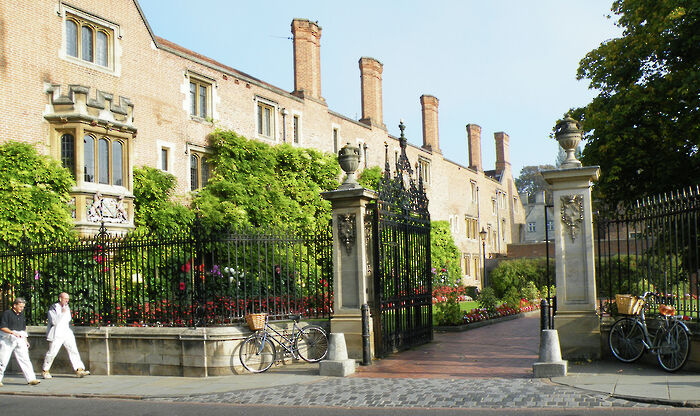Women at Magdalene: A chequered history
Claire Gao takes a look at the transition of Magdalene from a male-only institution to one distancing itself from its anti-integrationist past

In 1988, Magdalene College’s flag flutters at half-mast. The mood is sombre; male members are wearing black armbands and the college is grieving.
This is how the first cohort of women were welcomed at Magdalene, the last college to accept female students – just a generation ago.
I hear from former and current students at the college about the pushback against reform, the significant progress in equality since then, and how its legacy has bled through to today.
Women before 1948 could not obtain a degree from Cambridge. Previous proposals for their acceptance in 1897 and 1921 were met with backlash, voted down by male university members who held protests in the streets, throwing eggs, defacing an effigy of a woman on a bike and putting up posters quoting Shakespeare’s Love Labour’s Lost: “No woman shall come within a mile of my court”.
While perhaps not as explicit as these street riots, the sexism at Cambridge post-integration takes on a subtle yet still noxious form.
The 1970s and 1980s saw a tidal wave of reform. Colleges started to integrate women, and Girton, the first women’s college and a key body in the fight for women’s degrees, began to admit men in 1977. Robinson College was founded and was the first undergraduate college to admit students on an equal basis from its inception, with Darwin in 1964 being the very first postgraduate college to do so.
Magdalene, however, became the last all-male college standing after Pembroke’s first women matriculated in 1984, and it would be until it accepted women in 1988. Perhaps in mourning, members of the college hoped to preserve Magdalene in martyrdom, at last falling to integration.
“Perhaps in mourning, members of the college hoped to preserve Magdalene in martyrdom, at last falling to integration”
A student whose uncle attended Magdalene while it was still all-male tells me that, in the 1980s, it was “strongly tied to drinking societies, the Pitt Club especially.” This on its own didn’t make Magdalene unique, as it’s no secret that gender-segregated drinking societies have existed at nearly every college. Yet, the same student notes that accounts heard from his mum, part of one of the first female cohorts matriculating at Downing in the same time period, suggest that Magdalene “had somewhat of a reputation for being an outlier” in the rapidly changing social climate of the University at the time.
For example, the Magdalene men “would often prefer to spend time with the women from the secretarial college in Cambridge rather than from those colleges that accepted women.” According to a member of a different college at this time, “this was to do with misogyny and a perception of women there being ‘easier’”.
But today, students emphasise that significant progress has been made. Magdalene still upholds its ‘traditional’ reputation, with its white-tie May Ball and elaborate formals, while moving away from its anti-integrationist past. It, along with most colleges, now has an even male-to-female ratio and added a Women’s Officer to the JCR after its celebration of 25 years of women studying there in 2013.
“An annual excuse to gawk at exclusively female bikini-clad students wrestling in a jelly pool”
But this journey has not come without some scandal. Cosmopolitan lists The Wyverns, Magdalene’s all-male drinking society, as one of 'the UK’s most controversial drinking societies’. This is perhaps thanks to their infamous ‘jelly wrestling’ contest, an annual excuse to gawk at exclusively female bikini-clad students wrestling in a jelly pool. It was cancelled in 2013 after a petition started by another Magdalene student called out its objectification of women.
This picture of the Magdalene of the 2010s can be confirmed by singer, actor and alumnus Rina Sawarama, who matriculated in 2009. During her appearance at the Cambridge Union last term, she described how it was “quite a conservative college” compared to others.
But this nowadays is only representative of a “a very small minority of people from a particular background” one current student maintains. Remnants of inequality specific to Magdalene seem to be confined to tensions within the college’s boat club, where most of the funding goes towards the men’s side and the perpetuation of the all-male drinking society. The Wyverns make themselves known throughout the college despite supposedly being a ‘secret’ society, I’m told, and another student says that former members are even displayed on the walls of The Pickerel, the pub owned by Magdalene. A now-defunct women's counterpart was even formed in response, aptly named ‘The 1988 Society’.
Lads’ culture and misogyny exist everywhere, even at supposedly more ‘progressive’ colleges such as Homerton, which recently came under criticism for the removal of students’ consent campaign posters. But alongside this exists strong “camaraderie between women”, as one student puts it, and Magdalene’s progress in 35 years gives hope for further equality.
 News / Uni to ‘review’ tripos rankings and weekend lectures in undergrad teaching overhaul10 April 2025
News / Uni to ‘review’ tripos rankings and weekend lectures in undergrad teaching overhaul10 April 2025 News / Rowing row continues as Oxford and Cambridge scrap women’s trial race9 April 2025
News / Rowing row continues as Oxford and Cambridge scrap women’s trial race9 April 2025 News / PETA urges Cambridge dictionary to change ‘derogatory’ rat definition11 April 2025
News / PETA urges Cambridge dictionary to change ‘derogatory’ rat definition11 April 2025 News / First candidate to announce chancellorship bid pledges to tackle bullying 12 April 2025
News / First candidate to announce chancellorship bid pledges to tackle bullying 12 April 2025 Lifestyle / Blind Date: ‘She owes me a round of drinks!’13 April 2025
Lifestyle / Blind Date: ‘She owes me a round of drinks!’13 April 2025




